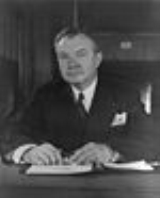
(1940–1941) and an Associate Justice
of the United States Supreme Court
(1941–1954). He was also the chief United States prosecutor at the Nuremberg Trials
. A "county-seat lawyer", he remains the last Supreme Court justice appointed who did not graduate from any law school (though Justice Stanley Reed
who served from 1938–1957 was the last such justice to serve on the court), although he did attend Albany Law School
in Albany, New York
for one year.
The mere state of being without funds is a neutral fact — constitutionally an irrelevance, like race, creed, or color.![]()
Civil liberties had their origin and must find their ultimate guaranty in the faith of the people. If that faith should be lost, five or nine men in Washington could not long supply its want.![]()
As to ethics, the parties seem to me as much on a parity as the pot and the kettle. But want of knowledge or innocent intent is not ordinarily available to diminish patent protection.![]()
The price of freedom of religion or of speech or of the press is that we must put up with, and even pay for, a good deal of rubbish.![]()
A confession is wholly and incontestably voluntary only if a guilty person gives himself up to the law and becomes his own accuser.![]()
The physical power to get the money does not seem to me a test of the right to tax. Might does not make right even in taxation. To hold that what the use of official authority may get the state may keep, and that if it cannot get hold of a nonresident stockholder it may hold the company as hostage for him, is strange constitutional doctrine to me.![]()
I do not know whether it is the view of the Court that a judge must be thick-skinned or just thick-headed, but nothing in my experience or observation confirms the idea that he is insensitive to publicity. Who does not prefer good to ill report of his work? And if fame — a good public name — is, as John Milton|Milton said, the "last infirmity of noble mind", it is frequently the first infirmity of a mediocre one.![]()

